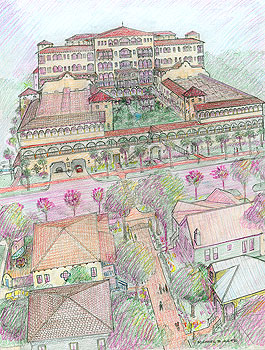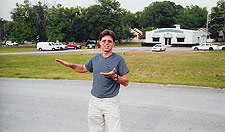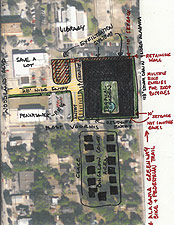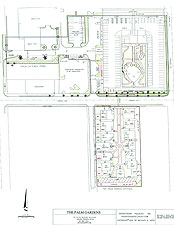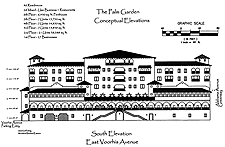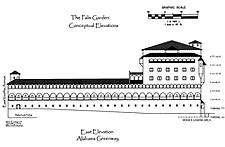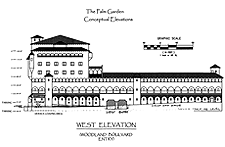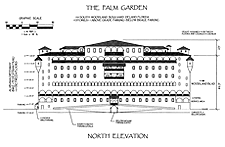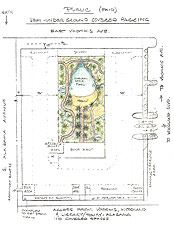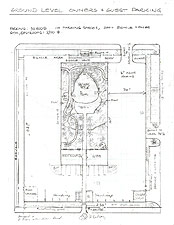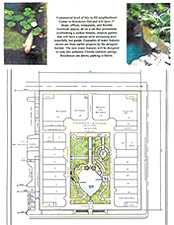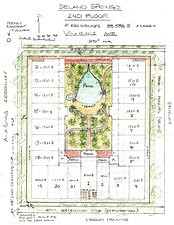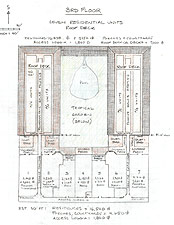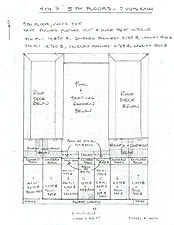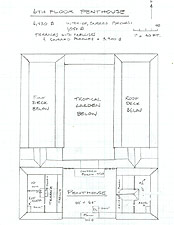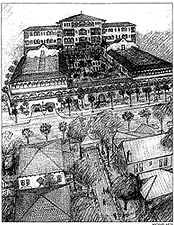 |
|
PRESS RELEASE "THE
PALM GARDEN," A MAJOR PEDESTRIAN VILLAGE DEVELOPMENT,
Photos and Illustrations and any part of this press release may be downloaded from pedestrianvillages.com for reprinting in any story about this project. Accompanying illustrations: Pedestrian Villages, Inc. is in the process of developing an additional four acres of land in downtown DeLand’s Historic Garden District. This will complement Michael E. Arth’s earlier renovation of 30 homes and businesses in the same neighborhood. Phase II and Phase III of the Garden District Redevelopment will consist of The Palm Garden Cottages and The Palm Garden, which have been approved as a Planned Development by the City of DeLand. The Palm Garden Cottages, located at East Voorhis Avenue and Clake Street, consist of 12 homesites with additional shared guest parking, a pool, and a pool house. The proposed houses and houses will face a tree-lined, brick pedestrian lane that will feature a central fountain. All of the garages are at the rear on a street or alley. For more information go to the palmgardencottages.com The Palm Garden is proposed to have the main public entrance at 235 South Woodland Blvd with the main residential entry on East Voorhis. This pedestrian-oriented commercial and residential development, on 2.52 acres, will surround a tropical oasis and spring-like pool with waterfalls. The Spanish Colonial Revival style main complex will be reminiscent of some of the grand resort hotels built in DeLand and San Augustine over a century ago. The site will host a tropical botanic garden, 52 residences and 27 businesses lining a covered promenade with sidewalk cafés and restaurants. A bike, Segway, and electric scooter shop will be located on the public parking level. Solar panels on the roof will heat the pool. There are to be two levels of semi-underground parking, parking for at least 200 bicycles, one level of retail, and four levels of residences.
The Palm Garden History and Philosophy It was late 2000 when Michael E. Arth first proposed building a café-restaurant complex with a natural-style swimming pool set in a botanical garden. At the time he was also negotiating the purchase of most of the buildings in the neighborhood immediately to the east. The watering hole was to have been called “DeLand Springs.” The current configuration came about in 2005 as a way to incorporate the earlier ideas but also to further energize the revival of downtown DeLand and the Garden District, and to provide much sought after downtown housing. Arth realized that it was possible to create an outdoor tropical garden because the design and orientation of the building, combined with the sunken location of the garden and heated water features, will create a micro-climate that will protect the plants and trees from freezes. Coconut palms, ferns, cycads, and other tropical plants will be growing outdoors in downtown DeLand. The natural style pools will resemble natural springs with waterfalls spilling over coquina rock cliffs. The pool and a spa will be reserved for the use of residents, shop-owners and their guests, but the multi-level botanical garden will be accessible to the public from a loggia that covers the promenade and from a lush jungle trail that winds up through the garden from the public parking level. There will be viewing pool with waterfalls accessible to the public. DeLand’s downtown has been coming back to life after the post-war flight to the suburbs and the ravages of sprawl. This revival is the result of a public yearning for an old-fashioned style of downtown coupled with two decades of work by local merchants, public officials, developers, preservationists, and local boosters. However, there are still a number of critical missing ingredients that we need in order to facilitate the full flowering of the central core:
The Palm Garden will help provide most of these elements, even if the other changes do not take place in downtown DeLand. Some people have asked if a small town like DeLand can support a grand project like this. People are in the habit of asking this because most new developments are built to feed off prior development, which has since World War II been more parasitic and destructive than synergistic. A big-box retailer, more strip development, or a typical apartment complex is ugly, unsustainable, and just creates more traffic without giving anything of beauty or lasting value to the community. Typical development provides housing and convenient shopping, but serious quality of life issues are ignored. The practice of building cities devoted to serving and storing cars has resulted in what author James Howard Kunstler in the Geography of Nowhere calls our “national automobile slum.” A typical beachside condo takes something away from its environment. It visually degrades its surroundings, creates more traffic in an area already blighted by automobiles and paving, and it blocks the natural processes that shape the coastline. The Palm Garden and other Pedestrian Villages will give something to community at the same time as enhancing the quality of life for the residents and retailers who will live and work there. The Palm Garden will provide a cohesive and vital neighborhood in an old-fashioned, historic downtown, and still allow easy access to pristine beaches and other area attractions within a short walk, bike, or drive. The proposed multi-use trail next to the project will connect to countywide bike trails. Palm Garden residents will overlook a protected and verdant tropical oasis surrounded with cafes, restaurants and interesting shops. DeLand has a enviable combination of climate, location, history, and potential both as a place to live and for a place to nurture the New Pedestrianism. With 900 people moving to Florida every day it is very important to protect our natural resources while creating new places that people will care about, and which will endure. |
Home - The New Pedestrianism - Michael E. Arth - Philosophy - Places - Press - Contact Copyright © 2004 PedestrianVillages.com |
